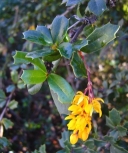
Photo ©2008 Z. Akulova
More photos
Photo ©2008 Z. Akulova

Berberis - Berberis spp.
Family - Berberidaceae
Also known as - Barberry
This plant is poisonous
Berberis is a popular perennial garden shrub, often grown for its colourful flowers and berries, but with several species being very thorny they are also planted as dense hedging to deter or restrict pedestrian traffic. Several species have gained the Royal Horticultural Society's Award of Garden Merit.
It is a diverse almost worldwide genus of both Evergreen and Deciduous shrubs growing from 1–5m (3–16ft) tall, flowers as singles or racemes of up to 20 are usually yellow or orange, 3–8mm (0.1–0.3in) long, with six petals and sepals usually of the same colour in whorls of three. Matures to a small berry 5–15mm (0.2–0.6in) long, that can be either spherical or oval, variable in colour red, orange or dark blue, often with a waxy surface bloom. Superficially the leaves of some Berberis species are similar to that of Mahonia.
Berberis species are used as food plants by the larvae of some Lepidoptera species, including the Barberry Carpet moth Pareulype berberata, and Mottled Pug Eupithecia exiguata. The Common Barberry B. vulgaris is also noted for being an alternate host species for Puccinia graminis the wheat rust fungus, as its name suggests a fungal disease of wheat and similar grains. Imports of Common Barberry into the United States are restricted. Other Berberis species can become invasive including B. darwinii where it is now banned from sale and propagation New Zealand and B. thunbergii in the United States.
BCP do not advise or recommend that Berberis – Berberis ssp. is eaten or used as an herbal remedy. Berberis vulgaris berries are rich in vitamin C, but with a sharp acid flavour. The dried fruit of Berberis vulgaris is used in herbal medicine. Historically, a yellow dye was extracted from the stem, root, and bark.
| B. thunbergii | ← — B. darwinii — → | ||||
 Photo ©2004 MPF |
 Photo ©2015 N. Stevenson |
 Photo ©2006 Lin linao | |||
Click any photo for a larger image | |||||
Site design ©1999– Brickfields Country Park - Privacy -